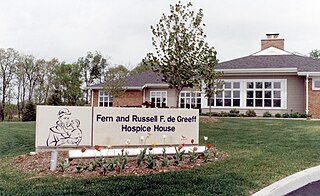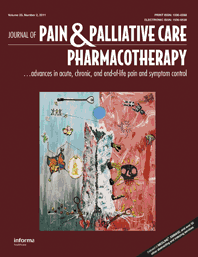Palliative care is an interdisciplinary medical caregiving approach aimed at optimizing quality of life and mitigating suffering among people with serious, complex, and often terminal illnesses. Within the published literature, many definitions of palliative care exist. The World Health Organization (WHO) describes palliative care as "an approach that improves the quality of life of patients and their families facing the problems associated with life-threatening illness, through the prevention and relief of suffering by means of early identification and impeccable assessment and treatment of pain, illnesses including other problems whether physical, psychosocial, and spiritual". In the past, palliative care was a disease specific approach, but today the WHO takes a broader patient-centered approach that suggests that the principles of palliative care should be applied as early as possible to any chronic and ultimately fatal illness. This shift was important because if a disease-oriented approach is followed, the needs and preferences of the patient are not fully met and aspects of care, such as pain, quality of life, and social support, as well as spiritual and emotional needs, fail to be addressed. Rather, a patient-centered model prioritizes relief of suffering and tailors care to increase the quality of life for terminally ill patients.

Government Medical College, Kozhikode, also known as Calicut Medical College, is a public medical college in Kozhikode, in the Indian state of Kerala.
In medicine, specifically in end-of-life care, palliative sedation is the palliative practice of relieving distress in a terminally ill person in the last hours or days of a dying person's life, usually by means of a continuous intravenous or subcutaneous infusion of a sedative drug, or by means of a specialized catheter designed to provide comfortable and discreet administration of ongoing medications via the rectal route.
Terminal illness or end-stage disease is a disease that cannot be cured or adequately treated and is expected to result in the death of the patient. This term is more commonly used for progressive diseases such as cancer, dementia or advanced heart disease than for injury. In popular use, it indicates a disease that will progress until death with near absolute certainty, regardless of treatment. A patient who has such an illness may be referred to as a terminal patient, terminally ill or simply as being terminal. There is no standardized life expectancy for a patient to be considered terminal, although it is generally months or less. Life expectancy for terminal patients is a rough estimate given by the physician based on previous data and does not always reflect true longevity. An illness which is lifelong but not fatal is a chronic condition.

Dame Cicely Mary Strode Saunders was an English nurse, social worker, physician and writer. She is noted for her work in terminal care research and her role in the birth of the hospice movement, emphasising the importance of palliative care in modern medicine, and opposing the legalisation of voluntary euthanasia.

Levomepromazine, also known as methotrimeprazine, is a phenothiazine neuroleptic drug. Brand names include Nozinan, Levoprome, Detenler, Hirnamin, Levotomin and Neurocil. It is a low-potency antipsychotic with strong analgesic, hypnotic and antiemetic properties that are primarily used in palliative care.
The European Journal of Palliative Care is the official journal of the European Association for Palliative Care. It publishes articles on the latest advances in palliative care in Europe and facilitate communication between healthcare professionals working in the field.
End-of-life care (EOLC) is health care provided in the time leading up to a person's death. End-of-life care can be provided in the hours, days, or months before a person dies and encompasses care and support for a person's mental and emotional needs, physical comfort, spiritual needs, and practical tasks.
The Liverpool Care Pathway for the Dying Patient (LCP) was a care pathway in the United Kingdom covering palliative care options for patients in the final days or hours of life. It was developed to help doctors and nurses provide quality end-of-life care, to transfer quality end-of-life care from the hospice to hospital setting. The LCP is no longer in routine use after public concerns regarding its nature. Alternative methodologies for Advance care planning are now in place to ensure patients are able to have dignity in their final hours of life. Hospitals were also provided cash incentives to achieve targets for the number of patients placed on the LCP.

Oncology is a branch of medicine that deals with the study, treatment, diagnosis, and prevention of cancer. A medical professional who practices oncology is an oncologist. The name's etymological origin is the Greek word ὄγκος (ónkos), meaning "tumor", "volume" or "mass". Oncology is concerned with:

Hospice care is a type of health care that focuses on the palliation of a terminally ill patient's pain and symptoms and attending to their emotional and spiritual needs at the end of life. Hospice care prioritizes comfort and quality of life by reducing pain and suffering. Hospice care provides an alternative to therapies focused on life-prolonging measures that may be arduous, likely to cause more symptoms, or are not aligned with a person's goals.

The Journal of Pain & Palliative Care Pharmacotherapy is a quarterly peer-reviewed medical journal covering advances in acute, chronic, and end-of-life symptom management. It is published by Informa Healthcare and the editor in chief is Arthur G. Lipman. The journal was established in 1993 as the Journal of Pharmaceutical Care in Pain & Symptom Control, obtaining its current title in 2001.
Diane E. Meier, an American geriatrician and palliative care specialist. In 1999, Dr. Meier founded the Center to Advance Palliative Care, a national organization devoted to increasing access to quality health care in the United States for people living with serious illness. She continues to serve as CAPC's Director Emerita and Strategic Medical Advisor. Meier is also Vice-Chair for Public Policy, Professor of Geriatrics and Palliative Medicine and Catherine Gaisman Professor of Medical Ethics at the Icahn School of Medicine at Mount Sinai Hospital in New York City. Meier was founder and Director of the Hertzberg Palliative Care Institute at the Icahn School of Medicine in New York City from 1997 to 2011.

The Indian Journal of Anaesthesia is a peer-reviewed open-access medical journal published by Medknow Publications on behalf of the Indian Society of Anaesthesiologists. It covers anaesthesiology, critical care medicine, pain and palliative care, disaster management, and trauma and emergency medicine.
Robert Twycross is a retired British physician and writer. He was a pioneer of the hospice movement during the 1970s, when he helped palliative care gain recognition as an accepted field of modern medicine.

Palliative Medicine is a peer-reviewed academic journal that publishes papers in the field of medicine. The journal's editor is Catherine Walshe. It has been in publication since 1987 and is currently published by SAGE Publications on behalf of the European Association for Palliative Care.
Indian Journal may refer to:

M. R. Rajagopal is an Indian palliative care physician (anesthesiologist) and professor referred to as the 'father of palliative care in India' in honour of his significant contribution to the palliative care scene in India.
Luis Jose De Souza is an Indian surgical oncologist and the founder of Shanti Avedna Ashram, a charitable trust which runs a network of hospices in Mumbai and Goa. He has also contributed to the establishment of Indian Cancer Cell, an educational program co-sponsored by Tata Memorial Centre, Union for International Cancer Control (UICC) and Indian Cancer Society, for creating cancer awareness in schools. The Government of India awarded him the fourth-highest civilian honour of the Padma Shri in 1992.

Harvey Max Chochinov is a Canadian academic and psychiatrist from Winnipeg, Canada. He is a leading authority on the emotional dimensions of end-of-life, and on supportive and palliative care. He is a Distinguished Professor of Psychiatry at the University of Manitoba and a Senior Scientist at CancerCare Manitoba Research Institute.










